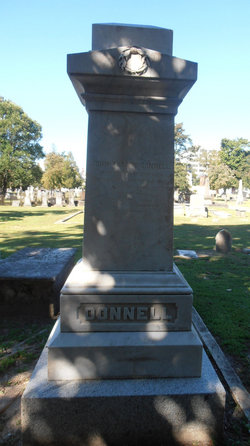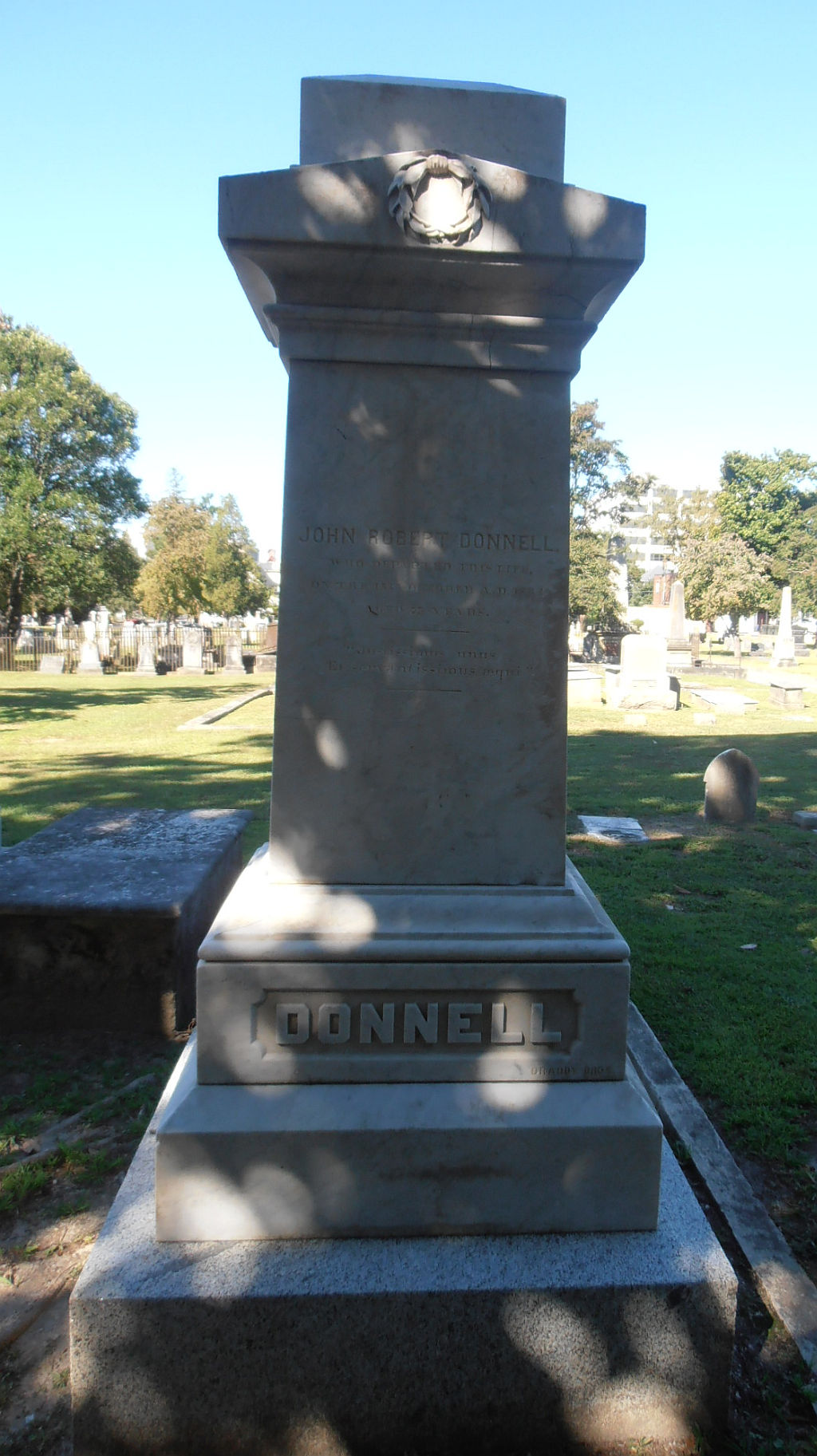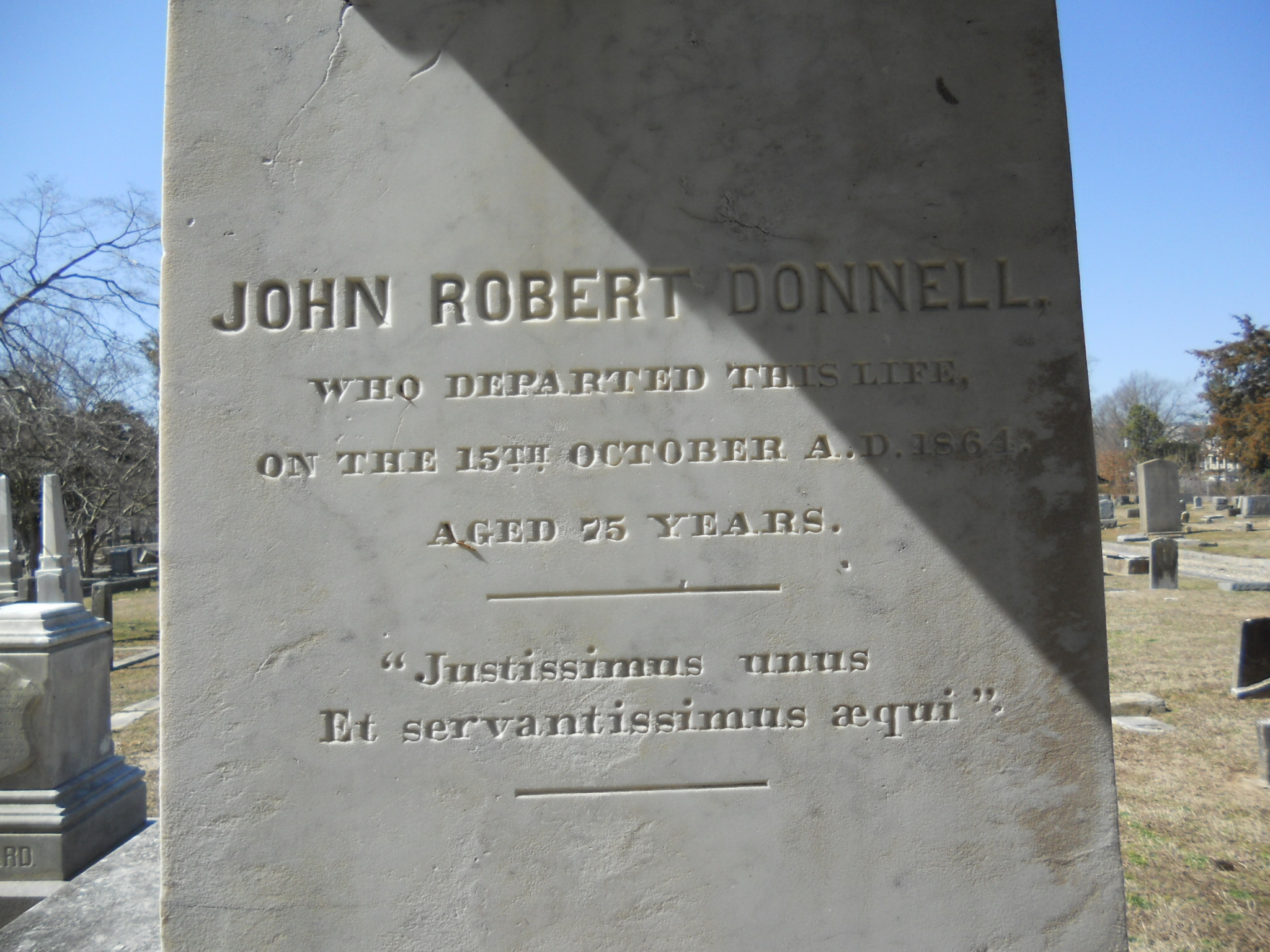John immigrated to Craven County, NC in 1799 when he was 10-years old, and was taken under the tutelage of his uncle, Robert Donnell, who had immigrated earlier and married Elizabeth "Eliza" Daly, daughter of Capt. John Daly a wealthy merchant/planter, who had immigrated from the West Indian Island of Montserrat in the early 18th Century and later built "Rocky Run" plantation in Lenoir County.
Little of John's early life in America is known. His uncle and guardian, Robert Donnell, died around 1811 in Lenoir County, and his wife later remarried. John Donnell was only 16 years old when he entered the University of North Carolina (UNC), from where he graduated in 1807; in the same class with the noted Gavin Hogg and others of his generation who contributed so much to this state. He studied law, and was a successful and popular advocate. In 1815 he was elected the Solicitor of the Newbern District.
On June 18, 1816, the 27-year old attorney married 16-year old Margaret Elizabeth Spaight, daughter of former NC Gov. Richard Dobbs Speight (1758-1802) and his wife, Mary Jones Leach.
Margaret Spaight Donnell was a noted beauty of her time, and a lovely portrait of her hangs in the NC Museum of History in Raleigh, NC. Her father, Gov. Spaight, who was of Irish descent, had built Clermont Plantation, one of the earliest plantations in Craven County. Gov. Spaight died in 1802 when he was killed in a duel by a political rival, John Stanly. Although Gov. Speight had 3 sons who lived to maturity, all died unmarried; so the Spaight line only continued through his daughter, Margaret Spraight Donnell.
John and Margaret Donnell would become parents to 6 known surviving children:
1. -- Margaret Spaight Donnell (1817-1883).
Margaret married in 1840, becoming the second wife of Congressman, Charles Biddle Shepard (1808-1843) in 1840 and was mother to 2 known children: Margaret Donnell Shepard (1841-1829); and Mary Spaight Shepardl.
2. -- Congressman, Richard Spaight Donnell (1820-1867)
3. -- Ann Margaret Donnell (1823-1908)
4. -- Margaret Elizabeth Donnell (1828-1836). Margaret died at age 8 and is buried near her mother in the Spaight cemetery at Clermont Plantation in New Bern.
5. -- Frances Leach Donnell (1825-1845). Frances married James Biddle Shepard in 1844 and was mother to one known child. She and her family are buried in City Cemetery.
6. Charles Spaight Donnell (ca. 1830-1894), a daughter who generally went by C. Spaight, married wealthy Baltimore attorney, Thomas Mundell Keerl (ca. 1825-1888) in 1858 and removed to Baltimore. Mother of 3 children, with only one surviving -- Eversfield Fraser Keerl (ca. 1859-1895).
In 1819, the 30-year old lawyer was elected Judge of the Superior Courts of Law and Equity, which high position he held until his resignation in 1830.
A year after leaving the bench, Judge Donnell was widowed in 1831 when his lovely wife of just 15 years died at the young age of 31. She was buried at her family's estate "Clermont" in New Bern. Their daughter, Margaret, who died in 1836 would be buried there as well.
Judge John R. Donnell never remarried. He remained in New Bern where he was a large and wealthy landowner. Judge Donnell died during the last days of the Civil War, passing on October 16, 1864 at age 75. He was buried in City Cemetery where his daughter, Frances Leach Donnell (1824-1845) also rests.
Judge Donnell was remembered by his contemporaries as "an able, quiet, unobtrusive, upright gentleman. He bore with great equanimity the biting sarcasm which Mr. Stanly was in the habit of thrusting at the court, where Judge Donnell presided, whenever it suited his policy." (This is a reference to John Stanley, the man who had killed his father-in-law. Stanley was prosecuted for the murder, but was pardoned by the then NC Governor. Stanley later attained positions of honor and died in 1834; apparatus having no remorse for his actions.)
John's two half-brothers included William Shepherd Donnell (1819-1891) who set out for South America around 1835, then came to New Orleans where he became a cotton merchant and investor. He married Anna Isabella "Belle" Knox, the daughter of William Knox from Strabane, Ireland who came to America and founded the Central Bank of Alabama, the first bank in Montgomery. Belle Knox Donnell created a scandal when she abandoned William Donnell and their 3 children to "run off with a Spaniard". William Donnell was so outraged he made sure she never saw her children again. The couple later divorced and she married again in 1860 to John Henry Paull by whom she had several children. Perhaps he should have seen some inkling of Belle's fickle character in her youth, as the beautiful and charming Belle was already engaged to his brother, Ezekiel Donnell, when the couple met; but by her wedding nigh,t she and William had fallen in love and the marriage was called off. She then married William -- all when she was only sixteen years old.
Brother, Ezekiel J. Donnell (1822-1896) left New Orleans and removed to New York where he became a wealthy cotton broker. Here he married a local woman named Lydia Grace Moore(1818-1899) and had 5 known children. The couple resided in Richmond County in Staten Island, then moved to Brooklyn, and eventually he built a mansion on W. 58th Street. Ezekiel Donnell, who traveled widely, published several notable books on the cotton trade and tariffs, and was an early patron of the lending-library system. When he died, he left a sizable amount from his large estate to the NY Free Circulating Library, and The Donnell Library Center on W. 53rd Street in NY is named for him. Ezekiel died in of pneumonia in 1896, at age 74. Wife, Lydia, died 3 years later. Her heir and only surviving daughter, Florence, suffered a mental breakdown following the death of her parents, and made a rather public scene of it at the Plaza Hotel in 1899. She was taken to Bellevue Hospital and declared insane. She later was removed to an exclusive private asylum in Westchester County, NY.
There is good evidence that the American Donnells kept in contact with their family and relatives in Ireland, and Ezekiel Donnell was known to have visted his homeland in 1857 as reported in the Irish newspapers -- "Mr EZEKIEL DONNELL of New York, while lately on a visit to his relations at Ballee, having purchased the tenant-right of the large farm of Milltown, Ballymagorry, which he left in the hands of his father, his neighbours met on the 11th inst with 25 well-appointed ploughs, ploughed nearly all the ground intended for cropping this year."
John immigrated to Craven County, NC in 1799 when he was 10-years old, and was taken under the tutelage of his uncle, Robert Donnell, who had immigrated earlier and married Elizabeth "Eliza" Daly, daughter of Capt. John Daly a wealthy merchant/planter, who had immigrated from the West Indian Island of Montserrat in the early 18th Century and later built "Rocky Run" plantation in Lenoir County.
Little of John's early life in America is known. His uncle and guardian, Robert Donnell, died around 1811 in Lenoir County, and his wife later remarried. John Donnell was only 16 years old when he entered the University of North Carolina (UNC), from where he graduated in 1807; in the same class with the noted Gavin Hogg and others of his generation who contributed so much to this state. He studied law, and was a successful and popular advocate. In 1815 he was elected the Solicitor of the Newbern District.
On June 18, 1816, the 27-year old attorney married 16-year old Margaret Elizabeth Spaight, daughter of former NC Gov. Richard Dobbs Speight (1758-1802) and his wife, Mary Jones Leach.
Margaret Spaight Donnell was a noted beauty of her time, and a lovely portrait of her hangs in the NC Museum of History in Raleigh, NC. Her father, Gov. Spaight, who was of Irish descent, had built Clermont Plantation, one of the earliest plantations in Craven County. Gov. Spaight died in 1802 when he was killed in a duel by a political rival, John Stanly. Although Gov. Speight had 3 sons who lived to maturity, all died unmarried; so the Spaight line only continued through his daughter, Margaret Spraight Donnell.
John and Margaret Donnell would become parents to 6 known surviving children:
1. -- Margaret Spaight Donnell (1817-1883).
Margaret married in 1840, becoming the second wife of Congressman, Charles Biddle Shepard (1808-1843) in 1840 and was mother to 2 known children: Margaret Donnell Shepard (1841-1829); and Mary Spaight Shepardl.
2. -- Congressman, Richard Spaight Donnell (1820-1867)
3. -- Ann Margaret Donnell (1823-1908)
4. -- Margaret Elizabeth Donnell (1828-1836). Margaret died at age 8 and is buried near her mother in the Spaight cemetery at Clermont Plantation in New Bern.
5. -- Frances Leach Donnell (1825-1845). Frances married James Biddle Shepard in 1844 and was mother to one known child. She and her family are buried in City Cemetery.
6. Charles Spaight Donnell (ca. 1830-1894), a daughter who generally went by C. Spaight, married wealthy Baltimore attorney, Thomas Mundell Keerl (ca. 1825-1888) in 1858 and removed to Baltimore. Mother of 3 children, with only one surviving -- Eversfield Fraser Keerl (ca. 1859-1895).
In 1819, the 30-year old lawyer was elected Judge of the Superior Courts of Law and Equity, which high position he held until his resignation in 1830.
A year after leaving the bench, Judge Donnell was widowed in 1831 when his lovely wife of just 15 years died at the young age of 31. She was buried at her family's estate "Clermont" in New Bern. Their daughter, Margaret, who died in 1836 would be buried there as well.
Judge John R. Donnell never remarried. He remained in New Bern where he was a large and wealthy landowner. Judge Donnell died during the last days of the Civil War, passing on October 16, 1864 at age 75. He was buried in City Cemetery where his daughter, Frances Leach Donnell (1824-1845) also rests.
Judge Donnell was remembered by his contemporaries as "an able, quiet, unobtrusive, upright gentleman. He bore with great equanimity the biting sarcasm which Mr. Stanly was in the habit of thrusting at the court, where Judge Donnell presided, whenever it suited his policy." (This is a reference to John Stanley, the man who had killed his father-in-law. Stanley was prosecuted for the murder, but was pardoned by the then NC Governor. Stanley later attained positions of honor and died in 1834; apparatus having no remorse for his actions.)
John's two half-brothers included William Shepherd Donnell (1819-1891) who set out for South America around 1835, then came to New Orleans where he became a cotton merchant and investor. He married Anna Isabella "Belle" Knox, the daughter of William Knox from Strabane, Ireland who came to America and founded the Central Bank of Alabama, the first bank in Montgomery. Belle Knox Donnell created a scandal when she abandoned William Donnell and their 3 children to "run off with a Spaniard". William Donnell was so outraged he made sure she never saw her children again. The couple later divorced and she married again in 1860 to John Henry Paull by whom she had several children. Perhaps he should have seen some inkling of Belle's fickle character in her youth, as the beautiful and charming Belle was already engaged to his brother, Ezekiel Donnell, when the couple met; but by her wedding nigh,t she and William had fallen in love and the marriage was called off. She then married William -- all when she was only sixteen years old.
Brother, Ezekiel J. Donnell (1822-1896) left New Orleans and removed to New York where he became a wealthy cotton broker. Here he married a local woman named Lydia Grace Moore(1818-1899) and had 5 known children. The couple resided in Richmond County in Staten Island, then moved to Brooklyn, and eventually he built a mansion on W. 58th Street. Ezekiel Donnell, who traveled widely, published several notable books on the cotton trade and tariffs, and was an early patron of the lending-library system. When he died, he left a sizable amount from his large estate to the NY Free Circulating Library, and The Donnell Library Center on W. 53rd Street in NY is named for him. Ezekiel died in of pneumonia in 1896, at age 74. Wife, Lydia, died 3 years later. Her heir and only surviving daughter, Florence, suffered a mental breakdown following the death of her parents, and made a rather public scene of it at the Plaza Hotel in 1899. She was taken to Bellevue Hospital and declared insane. She later was removed to an exclusive private asylum in Westchester County, NY.
There is good evidence that the American Donnells kept in contact with their family and relatives in Ireland, and Ezekiel Donnell was known to have visted his homeland in 1857 as reported in the Irish newspapers -- "Mr EZEKIEL DONNELL of New York, while lately on a visit to his relations at Ballee, having purchased the tenant-right of the large farm of Milltown, Ballymagorry, which he left in the hands of his father, his neighbours met on the 11th inst with 25 well-appointed ploughs, ploughed nearly all the ground intended for cropping this year."
Inscription
"Justissimus unus
Et servantissimus aequi"
Family Members
Advertisement
Advertisement










